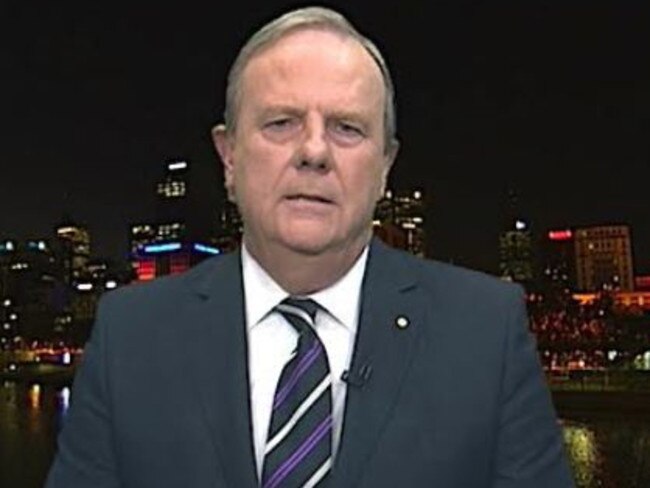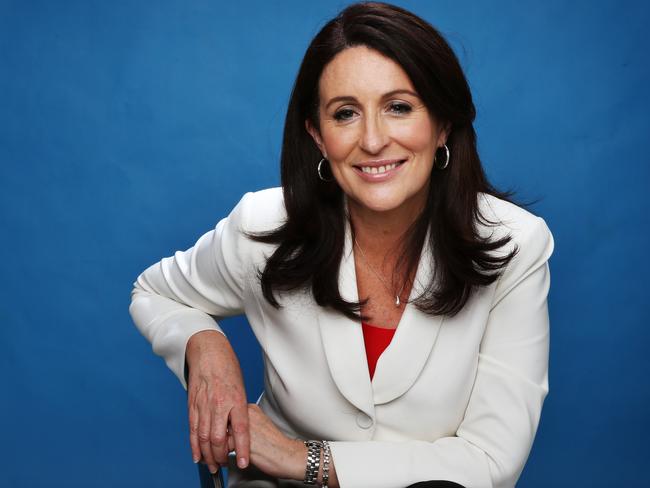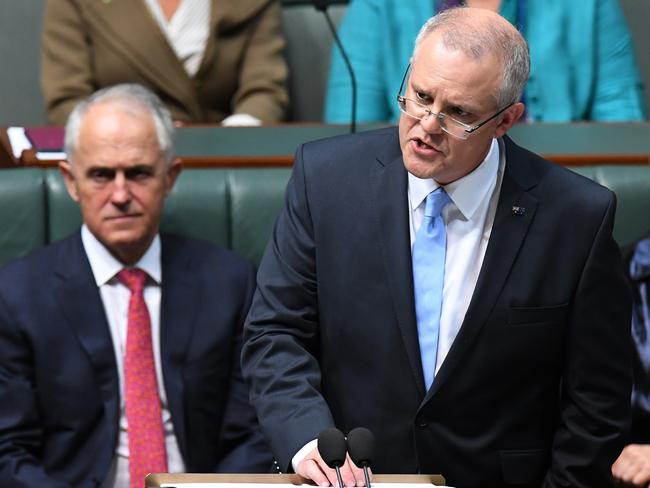Miranda Devine: How the ghosts of Budget past came back to haunt the Treasurer
THE ghosts of budgets past hung over Scott Morrison’s third herculean effort with the nation’s finances yesterday. The last treasurer actually to deliver surpluses (10 in a row) and pay down debt, Peter Costello, came back from the political dead on Monday night with a pointed budget eve interview on the ABC.
Opinion
Don't miss out on the headlines from Opinion. Followed categories will be added to My News.
THE ghosts of budgets past hung over Scott Morrison’s third herculean effort with the nation’s finances yesterday. The last treasurer actually to deliver surpluses (10 in a row) and pay down debt, Peter Costello, came back from the political dead on Monday night with a pointed budget eve interview on the ABC.
Costello exhorted the Turnbull government to spare a thought for the beleaguered wage and salary earners who pay some of the highest income taxes on the planet. Income tax from individual people accounts for almost half of the government’s revenue, while company tax accounts for just 20 per cent. Wage slaves are the government’s cash cow, and a very sullen cow it is after more than a decade without tax relief, being smashed by bracket creep, soaring living costs and sluggish wage growth.

Costello called them the “Forgotten People”, invoking the 1942 Menzian phrase still so potent in Liberal circles to describe the self-reliant Australian middle class.
They shoulder much of the tax burden. While almost half of all Australians receive more in welfare and handouts than they pay in tax, the two million Australians who earn between $87,000 and $180,000 pay 35 per cent of all personal income tax raised. Unlike big business, the Forgotten People don’t have silver tongued lobbyists pressing their case in Canberra, and they pay more than the corporate rate of tax.
MORE: Ten million Aussies to get tax break
MORE: Cash for companies employing older Aussies
MORE: Winners and losers for the 2018 Budget
“I think those forgotten people, those people that don’t have organised lobbyists to speak for them, also ought to be in the calculation of the government at the moment,” Costello said.
Well, mirabile dictu, it just so happens they are. The biggest surprise of the budget, and maybe the most pleasant surprise of the Turnbull government’s reign so far, is that serious income tax reform is in the offing, even while the budget comes back into surplus next year, a year earlier than anticipated.

The plan is to abolish the 37 per cent tax bracket so that everyone earning between $41,000 and $200,000 will pay just a 32.5 per cent flat tax. This is a significant reform, and the first substantial reduction to the income tax burden since Costello’s final budget in May 2007.
The bad news is that it won’t happen for seven years, in 2024-25, which is two or three elections away, and will have to be legislated to lock in any future Labor government.
The other sting in the tail is that the top marginal rate will remain at 47 per cent (including the two per cent Medicare levy), which is punitive compared to New Zealand’s top rate of 33 per cent, Singapore’s 22 per cent or Hong Kong’s 17 per cent. These are the 416,000 golden geese earning over $180,000 who contribute a whopping 30 per cent of total income tax.
There is additional good news in the form of an upfront tax relief stopgap sweetener in the form of a tax refund next July for lower and middle-income earners who will receive up to $530 each.
RELATED
And from 1 July this year, the top threshold for the 32.5 per cent tax bracket will be shifted up to $90,000, saving 210,000 people the burden of being shifted into the 37 per cent bracket. The Treasurer was in a jaunty mood yesterday when he visited journalists in the budget lockup in Parliament House in Canberra.
Locking in tax cuts is one way of starving the beast of Labor’s rapacious tax and spend appetite.
He also has put forward a tax “speed limit”, as he calls it, which will impose a voluntary discipline of keeping tax to 23.9 per cent of the gross domestic product and provides a “backstop on spending growth”. “Too much tax undermines the economy, costs jobs, undermines wages,” the treasurer said. When revenue rises to exceed the “speed limit” that will be the trigger for the government to give us back more of our taxes.
“You can’t just give governments blank cheques … In fact, we’re demanding we not be given one (and) others in politics can’t be trusted with one.”

The other significant narrative from this budget is that the proportion of working age Australians on welfare has dropped to 15.1 per cent, the lowest level in over 25 years.
“People have gone from taking welfare benefits to paying tax because they have a job,” Morrison said.
That is the best news of all, giving purpose and meaning to the lives of real people.
There also was a bit of red meat for the so-called base: an $83 million cut to the ABC’s gargantuan billion dollar-plus annual budget, which drew a dry comment from the Treasurer: “We all have to live within our means”.
Of course, hanging over the budget is the spectre of the national debt It took 10 budget surpluses for Costello to pay down the debt he inherited from Labor. But, with five times as much debt today, he says “most of us will be dead” before it’s paid off. Morrison has a plan, but it will take decades of budget surpluses.
It will be down to those oblivious schoolchildren who pushed merrily past journalists waiting in line outside the lockup yesterday.



